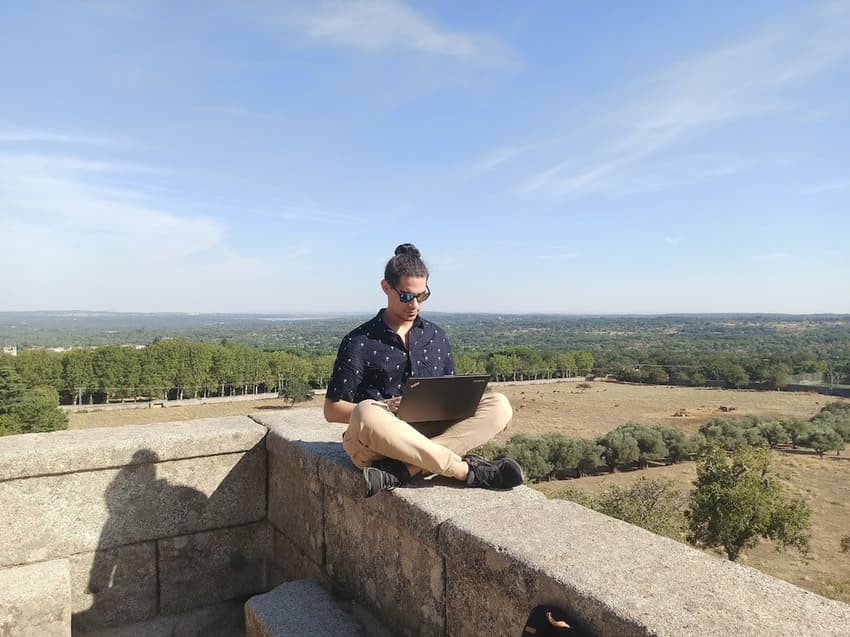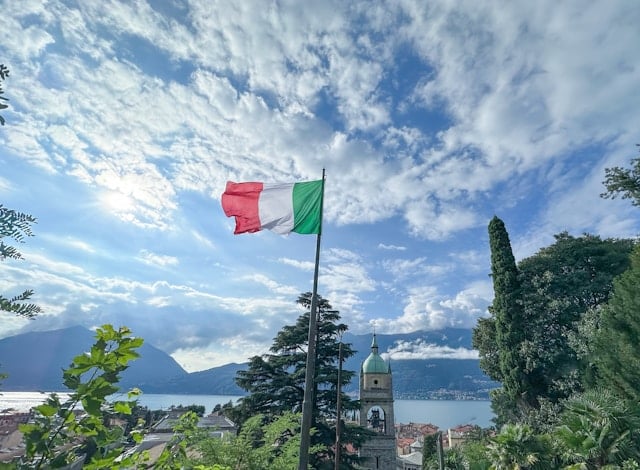'Go for it': The expert view on Italy's digital nomad visa

After Italy introduced its long-awaited digital nomad visa this month, The Local spoke to Italian immigration law expert Nick Metta to find out more about how the visa and application process works.
When Italy finally approved its much-anticipated digital nomad visa this month, there was excitement and a certain amount of disbelief among remote workers who'd been waiting years for such an announcement.
A number of The Local's readers got in touch with questions about how they could apply and how long the process could be expected to take.
We spoke with Italian immigration expert Nick Metta from the law firm Studio Legale Metta to learn more about the visa and how the scheme is likely to work in practice.
When do applications open?
An implementation decree such as this one is usually enforceable 15 days after its publication in the Official Gazette; however Metta notes that this particular decree came into force the day after it was published.
That was April 4th, so in theory applications should have been open from April 5th.
In practice, applications are handled by individual Italian consulates who have almost total control over the process and can choose their own start dates.
Metta says he's heard from several hopeful applicants who were told by their consulate that it's still too early to apply, and that he hasn't yet received updates or answers to his questions from some of the consulates he works with most closely.
READ ALSO: ‘Finally!’: Excitement and doubt as Italy confirms new digital nomad visa
"It doesn't mean that you can not apply because all the information is available, so you can apply and then the consulate has 90 days to sort it out," he says.
"But some consulates might be particularly strict and just refuse to take it in. Then at that point, you just need to wait a little bit."
How long should the application process take?
Metta estimates that it should take a well-organised person about a month to put together their documentation before booking an appointment.
"Between the health insurance and university degree or whatever else you might need, you probably need about a week to arrange a certified translation of documents... But three or four weeks should be enough."
Once you've filed your application, the consulate legally has up to 90 days to process it - but Metta's observed that most have been much quicker to turn them around in recent months.
"We've seen visas released on the same day, which is unheard of, and visas released the day after or within a week is becoming more and more common," he says.
That means that factoring in the time it takes to put together your application, the process could take up to four months, and possibly much less less time.

Can you make a living while travelling the world? Italy's new digital nomad visa is expected to make this easier. Photo by Persnickety Prints on Unsplash
Will you be able to obtain permanent Italian residency and citizenship on this visa?
As a general rule, you can obtain permanent Italian residency after five years and can apply for citizenship after ten years of continuous residency in Italy.
This is generally true "across the board; it comes with a certain number of years of legal immigration status," says Metta.
The digital nomad visa, he says, is no exception, though until you reach the five-year mark you will need to renew your residency on an annual basis and prove that you continue to meet the requirements.
How will taxes work on the digital nomad visa?
Metta notes that some changes that came into force at the start of this year have significantly altered Italy's tax residency rules.
Previously, anyone who was registered as an Italian resident with their local comune, or town hall (which you'd have to be if you wanted to renew your visa) was automatically considered a resident for tax purposes.
Now, he says, that's no longer necessarily the case - in theory you can be registered as resident locally in Italy without being considered an Italian tax resident.
READ ALSO: Q&A: Your questions answered about Italy's digital nomad visa
"That's an exception that's now open to people who might want to spend less than half the tax year in Italy but maintain their registered residency to keep the advantages that come with being a registered resident, including qualifying for citizenship in the future, without being a tax resident," Metta says.
"You kind of get the best of both worlds."
It's important to note that the burden of proof is still very high, however: you'd need to convince the authorities that you've been physically present in Italy for less than 183 days out of the year, and don't have your centre of vital interests (that is, close family) or habitual abode in Italy.
If you meet any one of these criteria, you'll have to pay Italian taxes on your worldwide income under the terms of whichever tax treaty your government has with Italy.
Do you need to open an Italian bank account?
Metta says some prospective applicants have raised the question of whether they would need to open an Italian bank account in order to prove that they're getting paid in Italy and meet the government's income requirements.

Italy's new digital nomad visa might be an option for some hoping to move to the country. (Photo by Claudio CRUZ / AFP).
"This is not necessary: you can keep your bank account overseas, and there are actually rules requiring you to report those bank accounts on your Italian tax return, unless some exceptions apply."
If you have an overseas employer or client, Metta notes, they'll often prefer to pay into your overseas bank account to avoid international wire transfer fees.
"So no worries about opening a bank account; you can move to Italy without opening an Italian bank account."
What's the difference between this and Italy's self-employed visa, which has been around for a while?
The self-employed visa falls under the decreto flussi, an annual quota of workers allowed entry to Italy from outside the EU for specific jobs, such as seasonal agricultural labour or care professions.
In previous years, the number of permits available for freelancers has averaged around 500, or less: Metta says in the past he's calculated that once you deduct the visas allocated to other types of work, the number of permits left for over self-employed people has totalled some 50-100 for the year.
"Many times you read the day after that the server crashed because it couldn't handle the amount of people that were trying to connect," he says.
"If you want to plan your move to Italy and have a little bit of means, you usually don't bank everything on a lottery."
Because the digital nomad visa isn't subject to the decreto flussi, there's no such upper limits on how many people can apply, making getting one a much more realistic prospect.
Were you surprised when this decree came out two years later than expected?
Metta says he was "surprised for several reasons" when he heard that the implementation decree had been approved.
The 2022 decree that gave the green light to an Italian digital nomad visa in principle was issued by a previous government (the proposal was put forward by an MP from the Five Star Movement, a party that's no longer in power).
Italy has always been fairly protectionist in its policies, and the current government in particular is known for its nativist stance on many issues, from language to food production.

Italy's new digital nomad visa gives a new option to people hoping to work and travel in the country. Photo by Tanya Lapko on Unsplash
Bearing this in mind, Metta says this new decree is notably lenient in that doesn't specify that the applicant's employer/client(s) must be based outside Italy, which is a standard feature of Italy's immigration laws.
"I expected this law to require that you could only work for employers overseas, frankly, so there would be less competition within the Italian market," he says.
"It's not directly saying you can be employed by an Italian employer, but there are so many references that make that an obvious conclusion."
Metta says it's not uncommon for the government to later amend a decree when they decide they've been too generous.
"That's probably what's going to happen here," says Metta: "they're going to get some pressure from unions, from other directions, and they might issue some amendments."
"So people who want it, I recommend go for it."
Comments
See Also
When Italy finally approved its much-anticipated digital nomad visa this month, there was excitement and a certain amount of disbelief among remote workers who'd been waiting years for such an announcement.
A number of The Local's readers got in touch with questions about how they could apply and how long the process could be expected to take.
We spoke with Italian immigration expert Nick Metta from the law firm Studio Legale Metta to learn more about the visa and how the scheme is likely to work in practice.
When do applications open?
An implementation decree such as this one is usually enforceable 15 days after its publication in the Official Gazette; however Metta notes that this particular decree came into force the day after it was published.
That was April 4th, so in theory applications should have been open from April 5th.
In practice, applications are handled by individual Italian consulates who have almost total control over the process and can choose their own start dates.
Metta says he's heard from several hopeful applicants who were told by their consulate that it's still too early to apply, and that he hasn't yet received updates or answers to his questions from some of the consulates he works with most closely.
READ ALSO: ‘Finally!’: Excitement and doubt as Italy confirms new digital nomad visa
"It doesn't mean that you can not apply because all the information is available, so you can apply and then the consulate has 90 days to sort it out," he says.
"But some consulates might be particularly strict and just refuse to take it in. Then at that point, you just need to wait a little bit."
How long should the application process take?
Metta estimates that it should take a well-organised person about a month to put together their documentation before booking an appointment.
"Between the health insurance and university degree or whatever else you might need, you probably need about a week to arrange a certified translation of documents... But three or four weeks should be enough."
Once you've filed your application, the consulate legally has up to 90 days to process it - but Metta's observed that most have been much quicker to turn them around in recent months.
"We've seen visas released on the same day, which is unheard of, and visas released the day after or within a week is becoming more and more common," he says.
That means that factoring in the time it takes to put together your application, the process could take up to four months, and possibly much less less time.

Will you be able to obtain permanent Italian residency and citizenship on this visa?
As a general rule, you can obtain permanent Italian residency after five years and can apply for citizenship after ten years of continuous residency in Italy.
This is generally true "across the board; it comes with a certain number of years of legal immigration status," says Metta.
The digital nomad visa, he says, is no exception, though until you reach the five-year mark you will need to renew your residency on an annual basis and prove that you continue to meet the requirements.
How will taxes work on the digital nomad visa?
Metta notes that some changes that came into force at the start of this year have significantly altered Italy's tax residency rules.
Previously, anyone who was registered as an Italian resident with their local comune, or town hall (which you'd have to be if you wanted to renew your visa) was automatically considered a resident for tax purposes.
Now, he says, that's no longer necessarily the case - in theory you can be registered as resident locally in Italy without being considered an Italian tax resident.
READ ALSO: Q&A: Your questions answered about Italy's digital nomad visa
"That's an exception that's now open to people who might want to spend less than half the tax year in Italy but maintain their registered residency to keep the advantages that come with being a registered resident, including qualifying for citizenship in the future, without being a tax resident," Metta says.
"You kind of get the best of both worlds."
It's important to note that the burden of proof is still very high, however: you'd need to convince the authorities that you've been physically present in Italy for less than 183 days out of the year, and don't have your centre of vital interests (that is, close family) or habitual abode in Italy.
If you meet any one of these criteria, you'll have to pay Italian taxes on your worldwide income under the terms of whichever tax treaty your government has with Italy.
Do you need to open an Italian bank account?
Metta says some prospective applicants have raised the question of whether they would need to open an Italian bank account in order to prove that they're getting paid in Italy and meet the government's income requirements.

"This is not necessary: you can keep your bank account overseas, and there are actually rules requiring you to report those bank accounts on your Italian tax return, unless some exceptions apply."
If you have an overseas employer or client, Metta notes, they'll often prefer to pay into your overseas bank account to avoid international wire transfer fees.
"So no worries about opening a bank account; you can move to Italy without opening an Italian bank account."
What's the difference between this and Italy's self-employed visa, which has been around for a while?
The self-employed visa falls under the decreto flussi, an annual quota of workers allowed entry to Italy from outside the EU for specific jobs, such as seasonal agricultural labour or care professions.
In previous years, the number of permits available for freelancers has averaged around 500, or less: Metta says in the past he's calculated that once you deduct the visas allocated to other types of work, the number of permits left for over self-employed people has totalled some 50-100 for the year.
"Many times you read the day after that the server crashed because it couldn't handle the amount of people that were trying to connect," he says.
"If you want to plan your move to Italy and have a little bit of means, you usually don't bank everything on a lottery."
Because the digital nomad visa isn't subject to the decreto flussi, there's no such upper limits on how many people can apply, making getting one a much more realistic prospect.
Were you surprised when this decree came out two years later than expected?
Metta says he was "surprised for several reasons" when he heard that the implementation decree had been approved.
The 2022 decree that gave the green light to an Italian digital nomad visa in principle was issued by a previous government (the proposal was put forward by an MP from the Five Star Movement, a party that's no longer in power).
Italy has always been fairly protectionist in its policies, and the current government in particular is known for its nativist stance on many issues, from language to food production.

Bearing this in mind, Metta says this new decree is notably lenient in that doesn't specify that the applicant's employer/client(s) must be based outside Italy, which is a standard feature of Italy's immigration laws.
"I expected this law to require that you could only work for employers overseas, frankly, so there would be less competition within the Italian market," he says.
"It's not directly saying you can be employed by an Italian employer, but there are so many references that make that an obvious conclusion."
Metta says it's not uncommon for the government to later amend a decree when they decide they've been too generous.
"That's probably what's going to happen here," says Metta: "they're going to get some pressure from unions, from other directions, and they might issue some amendments."
"So people who want it, I recommend go for it."
Join the conversation in our comments section below. Share your own views and experience and if you have a question or suggestion for our journalists then email us at [email protected].
Please keep comments civil, constructive and on topic – and make sure to read our terms of use before getting involved.
Please log in here to leave a comment.